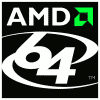http://jlp.holodeck1.com/blog/
2005-02-25
My Windows XP x64 Edition RC2 Benchmark
 I few days ago I have decided to do my own little benchmark of recently released 64-bit Windows XP Professional x64 Edition RC2 (build 1433, free download). I compared it to 32-bit Windows XP Pro with Service Pack 2 installed. My system has the following configuration:
I few days ago I have decided to do my own little benchmark of recently released 64-bit Windows XP Professional x64 Edition RC2 (build 1433, free download). I compared it to 32-bit Windows XP Pro with Service Pack 2 installed. My system has the following configuration:
- CPU: AMD Athlon 64 3000+ socket 754
- Motherboard: MSI K8T Neo-FIS2R (BIOS 2.0)
- Memory: 1 GiB Corsair TwinX-1024 3200LL
- Graphics: Leadtek WinFast A400 TDH (nVidia GeForce 6800)
- Hard disk: Hitachi 7K250 160 GiB with 8 MiB cache PATA
- Sound: Creative Labs Sound Blaster Audigy 2 ZS
Before benchmarking in 32-bit and 64-bit mode I have installed Windows XP Professional on fresh and installed all the latest official drivers that were available at that time. Every benchmark was run three times and then I calculated the average values which are listed in the tables below.
My first benchmark was in Sisoftware Sandra Lite. The version I used was 2005.2.10.50. I used 32-bit Sandra on 32-bit Windows and 64-bit Sandra on 64-bit Windows. Here are the results (higher is better):
| Benchmark | 32 on 32 | 64 on 64 | Factor |
|---|---|---|---|
| CPU Arithmetic Dhrystone ALU | 9104 MIPS | 9784 MIPS | 1,07 |
| CPU Arithmetic Whetstone FPU | 3122 MFLOPS | 3581 MFLOPS | 1,15 |
| CPU Arithmetic Whetstone iSSE2 | 4046 MFLOPS | 4165 MFLOPS | 1,03 |
| CPU Multimedia Integer aEMMX/aSSE (*) | 18875 it/s (*) | 14831 it/s (*) | 0,79 (*) |
| CPU Multimedia Float x4 iSSE2 | 20269 it/s | 22852 it/s | 1,13 |
| Memory Bandwidth Int Buff'd iSSE2 | 2898 MB/s | 2941 MB/s | 1,01 |
| Memory Bandwidth Float Buff'd iSSE2 | 2900 MB/s | 2938 MB/s | 1,01 |
| Cache & Memory Combined Index | 4630 MB/s | 4867 MB/s | 1,05 |
| Cache & Memory Speed Factor | 8,9 | 10,8 | 1,21 |
Then I tried some encoding of music into Ogg Vorbis (lossy) and FLAC (lossless) formats. Ogg Vorbis was version 1.1.0 and FLAC was 1.1.2. Since I couldn't find any 64-bit optimized binaries I used 32-bit ones in both Windows editions. Here are the results (lower is better):
| Benchmark | 32 on 32 | 32 on 64 | Factor |
|---|---|---|---|
| Ogg Vorbis Notorious B.I.G. | 21,9 s | 21,0 s | 1,04 |
| Ogg Vorbis Bach | 44,5 s | 41,8 s | 1,06 |
| Ogg Vorbis Tschaikowsky | 137,9 s | 130,0 s | 1,06 |
| FLAC Notorious B.I.G. | 29,0 s | 27,2 s | 1,07 |
| FLAC Bach | 58,3 s | 54,3 s | 1,07 |
| FLAC Tschaikowsky | 183,4 s | 170,8 s | 1,07 |
I also started the benchmark that is included in WinRAR 3.42 (higher is better):
| Benchmark | 32 on 32 | 32 on 64 | Factor |
|---|---|---|---|
| WinRAR | 483 KB/s | 500 KB/s | 1,04 |
I also checked the CPU time for 5 results for Einstein@Home project computed in each edition of Windows (lower is better):
| Benchmark | 32 on 32 | 32 on 64 | Factor |
|---|---|---|---|
| Einstein@Home | 23345 s | 22517 s | 1,04 |
What can I say. Quite good for a beta version of Windows without optimized drivers. But I guess these don't play such a big role in these tests. It is a bigger problem with games and until we get good 64-bit drivers it is just not worth to upgrade to 64-bit Windows XP Professional x64 Edition. Games will run quite a bit slower until then. On the other hand it looks like other applications mostly just get additional performance on 64-bit CPU like AMD Athlon 64 and using 64-bit OS. Even if the apps are only 32-bit. I can't wait for final release of Windows XP x64 Edition sometime in April and to see more 64-bit apps/drivers optimized for AMD64. Then Windows platform will catch the great support for AMD64 we now get with Linux distributions like Gentoo Linux.
UPDATE: This is what SiSoftware says about the unusually low CPU Multimedia Integer benchmark:
I will have to check out if this is true later. But judging from other results I am sure this one is also faster in 64-bit mode.As you know (E)MMX mode is not supported in Windows x64 thus the test in 64-bit mode uses SSE2. If you look at the bar in 64-bit mode (or results) you'll see x16 SSE2 not x4 EMMX/SSE.
This is a known issue with the K8 (Athlon/Opteron) which is why we use EMMX and not SSE2 in 32-bit mode. But we cannot use this in 64-bit mode.
If you disable "optimisation over-ride" you'll see that the SSE2 score in 32-bit is worse than EMMX and less than in 64-bit. Thus there is nothing wrong, the SSE2 code is faster in 64-bit than 32-bit but not faster than EMMX.
<< Home

